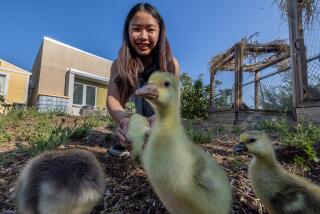They’re Down on the Farm--in Carson
- Share via
Instead of spending his money on compact discs or going out on weekends, high school junior Carlos Martinez has more than $2,000 invested in livestock: a pig, two sheep and three cows.
Martinez is among 40 Future Farmers of America based at Carson’s Stephen White Middle School, smack in the middle of the city.
Keeping piglets, lambs, calves and poultry in an urban area presents Carson FFA members with problems their country counterparts probably couldn’t imagine.
Last fall, someone jumped over the school’s fence and injured the group’s pregnant sow. Two weeks later she went into labor, but even with the students caring for her around the clock, she died shortly after giving birth to 13 piglets.
The students spend hours every day with their animals, teaching them to wear a halter and walk without fussing in competitions. Bolting or wiggling will keep the judge from being able to feel the muscle mass and bone length--keys to scoring points.
Caring for the mini-farm is hard work, requiring extra time on weekends and school holidays. But despite the difficult work, fascination with animals draws the future farmers to the barns, where they hang over the rails, comparing their animals.
Teacher Mark Nower, who runs the FFA program, said the students work together, helping each other learn about the animals and the competitions.
Jenny Borland, 15, plans to show her lamb, Lilly, and her pig, Lucy, at the fair. Borland watches over the program’s 18 pigs, making sure the students clean the pens and provide food and water.
“I even come here on the weekends. I’m never home,” Borland said.
Parents, administrators and students credit the vocational agriculture program with keeping the youths out of trouble and training them for a career.
“I would probably be at home doing nothing,” said ninth-grader Luis Rodriguez, 14, who got his first animal this year, a lamb named “Deadeye” for its brooding, dark eyes.
“This program has turned kids around who once were involved in drugs and gangs,” said Principal Carolyn Bohm
Nower said students who finish college have a good chance at working in agriculture.
Dominic Diaz,15, expects that after earning a degree in animal science he could work for a poultry company in the San Joaquin Valley. Diaz already runs an operation of his own.
“I have so many chickens it’s almost ridiculous,” he said.
He has more than 200 birds, including several varieties he crossbred. Each day, Diaz’s hens lay 150 to 175 eggs, most of which he sells to teachers or at the Torrance Farmers Market.
Members of the group don’t wear their royal blue FFA jackets around school, where they get teased for being farmers, but they slip the jackets on for FFA competitions, where they are recognized as tough competitors.
At a recent contest at Cal State Fresno, the team took first place in judging butchered chicken parts.
But even other future farmers sometimes razz them for being city slickers.
“They think we’re no good because we’re in the city, but our chapter has won some high honors,” Diaz said.
More to Read
Sign up for Essential California
The most important California stories and recommendations in your inbox every morning.
You may occasionally receive promotional content from the Los Angeles Times.













